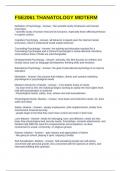FSE2061 THANATOLOGY MIDTERM
Definition of Psychology - Answer- The scientific study of behavior and mental
processes.
- scientific study of human mind and its functions, especially those affecting behavior
in a given context
Cognitive Psychology - Answer- all behavior is based upon the internal mental
processes, which if understood would explain behavior
Counseling Psychology - Answer- the training and education required for a
Counseling Psychologist and a Clinical Psychologist is nearly identical. therefore,
some believe these 2 fields are interchangeable
Developmental Psychology - Answer- primarily, this filed focuses on children and
include areas such as language development, thinking skills and emotions
Educational Psychology - Answer- the goal of educational psychology is to improve
education
Motivation - Answer- the process that initiates, directs and sustains satisfying
physiological or psychological needs
Maslow's Hierarchy of Needs - Answer- - Five distinct levels of needs.
- As each level is met, the individual begins working to satisfy the next higher level,
until self-auctualization is achieved
- Physiological needs, safety, love, esteem and self-auctualization
Physiological Needs- Maslow - Answer- most basic and instinctive needs. Air, food,
water and sleep
Safety- Maslow - Answer- -steady employment, safe neighborhoods, shelter from
environment, financial security.
- people begin to feel that they need more control and order in their lives
Love-Maslow - Answer- needs for belonging, love, and affection. needs are less
basic than physiological and security needs. Friendships, romantic attachments, and
families help fulfill this need for companionship and acceptance, as does
involvement in social, community, or religious groups
Esteem- Maslow - Answer- - gain respect and appreciation of others
- like going to school, playing a sport, enjoying a hobby
Self-Actualization- Maslow - Answer- Self-actualizing people are self-aware,
concerned with personal growth, less concerned with the opinions of others, and
interested fulfilling their potential
, Herzberg's Two Factor Theory - Answer- - 2 main factors that governed human
motivation. Maintenance and Motivation
- If maintenance goals are not met, the individual experiences a level of
dissatisfaction.
- once maintenance levels are achieved, person can work toward motivational goals
which cause the individual to excel in a given area
MacGregor's Theory X and Theory Y - Answer- Theory X believes employees are
lazy and only concerned for money.
- Theory Y believes employees will excel if given the right environment and
opportunities
Theory Z - Answer- - Began in Japan as Theory Y
- states all employees are motivated if they actively participate in decision-making at
ALL levels of the organization
- US companies have began to follow and now have Quality Teams and Employees
participation
Equity Theory - Answer- people are motivated by past experiences of the amount of
reward given for effort put forth
- ex. if employees works hard and receives same reward as other who haven't, they
will not work as hard in the future.
Expectancy Theory - Answer- motivation to accomplish a certain task is linked to the
probability of receiving the reward when the task is complete
Drive Theory - Answer- -biological needs arising within our bodies create unpleasant
states that lead us to behaviors to eliminate those feelings. Like getting a drink when
thirsty
Arousal Theory - Answer- motivation suggesting that humans seek an optimal level
of activation (desire), not minimal levels of desire. The desire to be the best we can
be. Example: a person who loves to knit, will have a drive to produce a perfectly
knitted product
Human Motives - Answer- Hunger and Thirst, Sensation seeking, Sex, Need for
achievement and Aggressive motivation
Aggressive motivation - Answer- the desire to harm or injure others in some manner
- this is the most dangerous motivation. It results in events like Columbine, Hitler's
treatment of the Jews in WWII
Emotion - Answer- reactions consisting of subjective cognitive states, physiological
reactions, and expressive behaviors
- are very personal and private. No one can truly share our subjective inner
experiences
- others can get an idea of how we are feeling by our expressions and non-verbal
communication
Stages of Memory - Answer- Encoding, Storage and Retrieving




